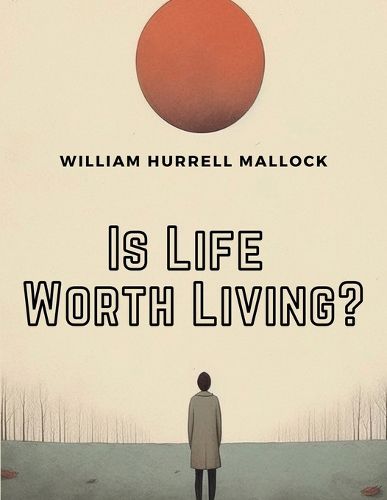Is Life Worth Living ?
William Hurrell Mallock

Is Life Worth Living ?
William Hurrell Mallock
This title is printed to order. This book may have been self-published. If so, we cannot guarantee the quality of the content. In the main most books will have gone through the editing process however some may not. We therefore suggest that you be aware of this before ordering this book. If in doubt check either the author or publisher’s details as we are unable to accept any returns unless they are faulty. Please contact us if you have any questions.
William Hurrell Mallock (7 February 1849 - 2 April 1923) was an English novelist and economics writer. A nephew of the historian Froude, he was educated privately and then at Balliol College, Oxford. He won the Newdigate Prize in 1872 for his poem The Isthmus of Suez and took a second class in the final classical schools in 1874, securing his Bachelor of Arts degree from Oxford University.
Mallock never entered a profession, though at one time he considered the diplomatic service. He attracted considerable attention by his satirical novel, largely a symposium like Plato's Republic, The New Republic (1877), conceived while he was a student at Oxford, in which he introduced characters easily recognized as such prominent individuals as Benjamin Jowett, Matthew Arnold, Violet Fane, Thomas Carlyle, and Thomas Henry Huxley.
Although the book was not well received by critics at first, it did cause instant scandal, particularly concerning the portrait of literary scholar Walter Pater: His [Pater's] first main work, Studies in the History of the Renaissance was published in 1873. Over the next three or four years it became the focus of considerable hostility towards Pater, principally reviewers objected to its amoral hedonism.
Moreover, Pater was the subject of a cruel satire in W. H. Mallock's The New Republic which was published in Belgravia in 1876-7 and in book form in 1877. He appeared there as 'Mr. Rose'-an effete, impotent, sensualist with a perchant for erotic literature and beautiful young men.
In the second edition of the Renaissance the 'Conclusion' was removed, partly in response to the public ridicule, but mainly because of pressure brought to bear on Pater within Oxford by figures such as Benjamin Jowett. In particular, the discovery of his 'relationship' with William Money Hardinge, a Balliol undergraduate, threatened Pater with a sexual scandal. Mallock's book appeared during the competition for the Oxford Professorship of Poetry and played a role in convincing Pater to remove himself from consideration.
A few months later Pater published what may have been a subtle riposte: "A Study of Dionysus: The Spiritual Form of Fire and Dew."Mallock's New Republic was an essential book to Ronald [Knox], perhaps his favourite work of secular literature outside the classics.
This item is not currently in-stock. It can be ordered online and is expected to ship in 7-14 days
Our stock data is updated periodically, and availability may change throughout the day for in-demand items. Please call the relevant shop for the most current stock information. Prices are subject to change without notice.
Sign in or become a Readings Member to add this title to a wishlist.


